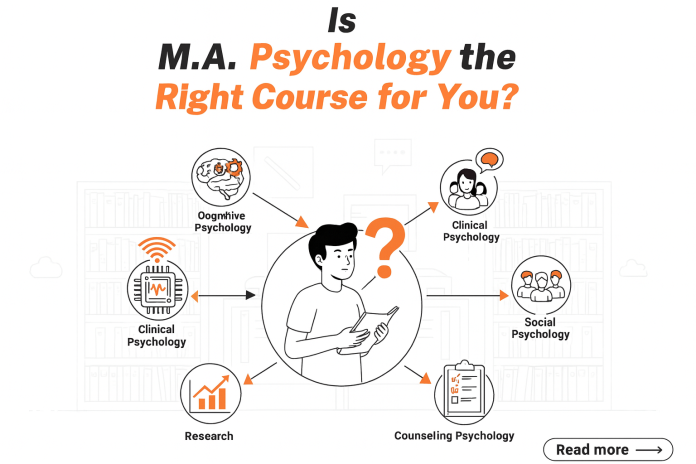- Importance of Postgraduate Decisions
- Understanding the Scope of M.A. Psychology
- Ideal Personality Traits for Psychology Students
- Benefits of Pursuing Psychology at the Master’s Level
- Challenges Faced in the Psychology Field
- Career Growth Potential in India & Abroad
- Alumni Success Stories
- How to Maximize Your Career with M.A. Psychology
- Final Verdict: Is M.A. Psychology the Right Fit for You?
- Frequently Asked Questions (FAQs)
Importance of Postgraduate Decisions
Choosing a postgraduate course is one of the most important academic and career decisions a student can make.
It marks a shift from general education to specialized expertise, shaping not only the learner’s knowledge but also their professional trajectory.
An M.A. Psychology holds significant value for individuals seeking to deepen their understanding of human behaviour and mental processes. It goes beyond foundational knowledge offered at the undergraduate level by providing advanced theoretical insights and practical training in areas such as counselling, clinical assessment, psychotherapy, and psychological research.
The M.A. Psychology programme not only enhances critical thinking, communication, and analytical skills but also prepares graduates to make a meaningful difference in people’s lives through evidence-based practice and ethical intervention. Therefore, this qualification is a vital step toward both professional credibility and personal growth in the field of psychology.
- Making informed psychology career decisions is crucial for students and professionals aiming to build a meaningful and successful future in this diverse field.
- Psychology offers a wide range of career paths—such as clinical psychology, counselling, organizational (I/O) psychology, educational psychology, forensic psychology, and research—each requiring specific skill sets, qualifications, and personal interests.
Choosing the right path involves careful consideration of one’s passion, strengths, and long-term goals. For instance, those interested in mental health and therapy may pursue clinical or counselling psychology, which often requires additional certifications and licensing.
The decision also depends on whether one wants to work directly with people, conduct research, influence policy, or contribute to academic knowledge. Additionally, factors like job demand, work-life balance, growth opportunities, and salary should be evaluated. Ultimately, thoughtful psychology career decisions can lead to fulfilling roles that not only match individual interests but also contribute meaningfully to society’s well-being.
- An M.A. in Psychology serves as a valuable foundation, offering advanced knowledge, practical skills, and diverse opportunities across mental health, education, industry, and research sectors. As the demand for qualified psychology professionals continues to grow, making the right psychology career decisions—aligned with one’s interests, strengths, and future goals—is more important than ever.
- With the right guidance and commitment, students can not only build rewarding careers but also make a positive impact on individuals and society at large.
Understanding the Scope of M.A. Psychology
The scope of M.A. Psychology Course is broad and ever-expanding, offering numerous opportunities for personal growth and professional advancement. This postgraduate programme equips students with a deep understanding of human behaviour, emotional regulation, and mental health, which are crucial in a wide variety of fields today.
One of the key psychology course benefits is its interdisciplinary relevance—graduates can apply their knowledge in sectors like healthcare, education, corporate organizations, social work, law enforcement, sports, and even technology.
Pursuing a psychology course, particularly at the postgraduate level like an M.A. Psychology, offers a wide range of academic, professional, and personal benefits.
Other emerging areas include forensic psychology, sports psychology, neuropsychology, and rehabilitation psychology. With increasing global awareness of mental health, the demand for trained psychology professionals continues to grow, making it a promising and impactful career choice.
With LPU’s recognized curriculum, experienced faculty, and opportunities for practical exposure, graduates are well-equipped to meet the growing demand for skilled psychology professionals in India and abroad.
The scope of M.A. Psychology is-
| Sector | Job Roles | Area |
| Clinical Psychology | Clinical Psychologist, Mental Health Counsellor | Hospitals, Clinics, Rehabilitation Centers |
| Counseling Psychology | School Counsellor, Marriage & Family Therapist | Schools, Colleges, NGOs, Private Practice |
| Organizational Psychology | HR Specialist, Corporate Trainer, Industrial Psychologist | Corporations, HR Firms, Consultancy Agencies |
| Educational Psychology | Educational Psychologist, Academic Counsellor | Schools, Universities, EdTech Companies |
| Forensic Psychology | Forensic Psychologist, Criminal Profiler | Law Enforcement, Correctional Facilities, Courts |
| Social Psychology | Social Researcher, Policy Advisor | Research Institutes, Government Agencies, NGOs |
Ideal Personality Traits for Psychology Students
Succeeding in the field of psychology requires more than just academic knowledge—it also demands specific personal qualities and a dedicated mindset. Among the key traits for psychology students are empathy, active listening, and strong communication skills, as these are essential for understanding and supporting others effectively.
Patience and emotional resilience are equally important, particularly when working with individuals facing complex mental health challenges. A curious and analytical mind helps students explore human behaviour scientifically, making critical thinking and attention to detail vital qualities for a psychology career.
Strong communication skills are also critical, as psychologists must listen actively, ask meaningful questions, and clearly explain complex ideas. Another key quality is emotional resilience, which enables professionals to manage their own reactions while supporting individuals through difficult or distressing situations.
Here are some of the ideal personality traits for psychology students-
- Empathy – Ability to understand and share the feelings of others
- Open-mindedness – Willingness to consider different perspectives without judgment
- Curiosity – Strong desire to learn about human behaviour and mental processes
- Patience – Especially important when dealing with clients or conducting research
- Good listening skills – Attentive and non-judgmental listening is crucial
- Emotional stability – Ability to manage one’s own emotions effectively
- Strong ethical sense – Integrity and confidentiality are vital in this field
- Critical thinking – Ability to analyze and evaluate issues logically and objectively
- Communication skills – Clear verbal and written expression of ideas
LPU’s supportive learning environment and emphasis on practical experience help nurture these qualities, preparing students to meet the diverse challenges of the field with confidence and compassion. Cultivating these traits not only enhances academic growth but also equips students to make meaningful contributions to individuals and society in their future professional roles.
Benefits of Pursuing Psychology at the Master’s Level
The benefits of an M.A. Psychology are manifold, making it a highly valuable postgraduate qualification for those interested in the science of human behaviour.
One of the primary advantages of a psychology master’s degree is the opportunity to gain advanced knowledge and specialized skills that go beyond undergraduate studies, allowing students to explore areas like clinical psychology, counselling, organizational behavior, and research methods in greater depth.
A psychology master’s degree offers several key advantages that significantly enhance both academic and career prospects. It provides advanced theoretical knowledge and practical skills that prepare graduates for specialized roles in counselling, clinical practice, research, and organizational settings.
This qualification often serves as a minimum requirement for many professional positions in mental health and human services, opening doors to jobs that are not accessible with only a bachelor’s degree.
- Beyond career benefits, a psychology master’s degree fosters personal growth, enhancing one’s understanding of human behaviour and interpersonal skills—qualities valuable in everyday life as well as professional contexts.
- Pursuing postgraduate studies in psychology offers numerous benefits that extend beyond gaining advanced knowledge. One of the primary postgraduate psychology benefits is the opportunity to develop specialized skills in areas such as clinical assessment, counselling techniques, research methodology, and data analysis.
- Another key benefit is the chance to engage in hands-on experience through internships and practical placements, which enhance real-world understanding and professional readiness.
LPU’s commitment to holistic education ensures that students gain not only theoretical knowledge but also the skills necessary for real-world psychological practice. Graduates are well-prepared for diverse career paths in mental health, counselling, academia, and organizational settings, both in India and internationally.
The training and experience gained at this level prepare graduates to excel in diverse professional roles, contribute meaningfully to mental health and human development, and pursue further academic and clinical qualifications.
Challenges Faced in the Psychology Field
Despite its rewarding nature, a career in psychology comes with several challenges in the psychology career that professionals must navigate.
One significant hurdle is the emotional and psychological toll that working with clients facing trauma, mental illness, or crisis situations can take on practitioners, often leading to burnout or compassion fatigue.
One of the primary challenges is meeting stringent licensing and certification requirements, which vary by region and specialization and often demand continuous education and supervision.
Funding constraints and limited resources in mental health services can also restrict opportunities for research and clinical practice. Another hurdle is overcoming societal stigma around mental health, which may affect client engagement and support for psychological interventions.
Furthermore, balancing high caseloads with self-care is essential to prevent burnout, a common issue among psychology professionals due to the emotionally demanding nature of their work. Successfully addressing these hurdles demands resilience, strong professional support networks, and a commitment to lifelong learning.
- One major limitation is the complexity and variability of human behaviour, which makes it difficult to develop universally applicable theories or treatments. Many psychological studies rely on self-reported data, which can be subjective and prone to bias.
- Additionally, cultural differences often challenge the generalizability of research findings, as much of the existing knowledge is based on Western populations.
- The multifaceted nature of mental health disorders means that diagnosis and treatment often involve trial and error, and effective interventions may vary widely between individuals. These limitations highlight the ongoing need for rigorous research, culturally sensitive approaches, and personalized care in psychology.
| Did You Know?
Psychologists are at risk of emotional exhaustion from constant exposure to trauma. A 2023 APA study found 44% of mental health professionals reported symptoms of burnout. |
Career Growth Potential in India & Abroad
The psychology career growth prospects both in India and abroad are increasingly promising, reflecting a global rise in awareness about mental health and well-being.
In India, the scope is expanding rapidly as educational institutions, healthcare providers, and corporate sectors recognize the value of psychological expertise in areas like counselling, clinical services, organizational development, and research.
- Government initiatives and NGO involvement in mental health programmes are further boosting job opportunities. Abroad, the demand for qualified psychologists continues to grow in countries such as the USA, Canada, Australia, and the UK, where mental health services are well-integrated into healthcare systems.
- The scope of psychology in India is expanding rapidly as mental health awareness gains momentum across the country. Increasing recognition of psychological well-being in healthcare, education, corporate sectors, and social services has created a growing demand for qualified psychology professionals.
Psychology jobs abroad offer diverse and rewarding career opportunities for qualified professionals, especially in countries with well-established mental health care systems such as the USA, Canada, the UK, Australia, and parts of Europe.
Some of the Career Growth Potential in Psychology: India vs Abroad-
| Aspect | India | Abroad |
| Education Path | MA/MSc → M.Phil/PhD for specialization & licensing | MA/MSc → PsyD/PhD (often required for clinical roles) |
| Licensing | RCI (Rehabilitation Council of India) for clinical roles | APA (USA), HCPC (UK), CPA (Canada), AHPRA (Australia), etc. |
| Entry-Level Roles | Counsellor, School Psychologist, NGO Worker | Assistant Psychologist, Mental Health Counsellor, Researcher |
| Job Market Demand | Growing, especially in urban areas, schools, and corporations | High, especially in clinical, educational, and organizational sectors |
The increasing demand for mental health professionals in India, coupled with ample opportunities in international markets, ensures that LPU psychology graduates are well-prepared to pursue successful and fulfilling careers worldwide. Overall, LPU’s commitment to excellence empowers students to make significant contributions in the evolving field of psychology.
Alumni Success Stories
Lovely Professional University’s M.A. Psychology programme has produced numerous successful alumni who serve as shining examples of the programme’s effectiveness and impact.
These psychology alumni success stories span a wide range of career paths, showcasing the versatility and applicability of the degree. Many graduates have secured prominent roles as clinical psychologists, counsellors, organizational psychologists, and researchers, both in India and abroad.
Some alumni have started their own mental health clinics or counselling centers, contributing directly to community well-being. Others have advanced into academia, pursuing doctoral studies and becoming educators who shape future generations of psychology professionals.
M.A. Psychology graduates from LPU build careers in corporate sectors, NGOs, and government health programmes, showcasing the growing demand for psychology professionals across industries.
These real-life psychology success stories highlight how LPU’s blend of rigorous academics, practical internships, and mentorship helps students develop the skills, confidence, and ethical grounding necessary to excel. Such achievements inspire current students and reinforce the university’s commitment to nurturing competent, compassionate professionals ready to make a meaningful difference.
- Swastika, one of the alumni of MA Psychology in LPU has placed at Inmovidu Technologies Limited as a Business Development Associate securing an impressive package reflecting outstanding skills, dedication and professional competence.
| Did You Know ?
Many assume MA Psychology only leads to becoming a therapist or counsellor — but alumni also work in UX design, corporate HR, policy research, criminal profiling, and even marketing. |
How to Maximize Your Career with M.A. Psychology
Earning a Master of Arts M.A. Psychology opens up a range of career paths—but making the most of your degree requires strategy, planning, and continuous growth.
Whether you’re looking to work in clinical settings, corporate environments, education, or research, here are actionable career tips for psychology graduates to help you maximize your psychology career.
Maximize your M.A. Psychology by focusing on a field that aligns with your strengths and interests. Common specializations include:
- Clinical Psychology
- Counseling Psychology
- Organizational/Industrial Psychology
- Educational Psychology
Employers value experience just as much as education. This builds your resume and your professional confidence.
Soft skills like empathy, active listening, and ethical reasoning are critical in psychology-related roles. Practice these through Role-plays and simulation workshops, and training programmes.
Networking is essential to maximize your psychology career:
Attend psychology conferences, seminars, and webinars
Join professional associations (APA, BPS, Indian Psychological Association, etc.)
Consider Certifications and Continued Learning, like Cognitive Behavioral Therapy (CBT), Neuropsychology, Child Psychology, HR/Organizational Psychology.
With an M.A. in Psychology, consider roles such as:
- Mental Health Counsellor
- Rehabilitation Specialist
- School Counselor
An M.A. in Psychology is more than just a degree—it’s a gateway to multiple impactful career paths. By combining education with real-world experience, continued learning, and strategic networking, psychology graduates can thrive in both traditional and emerging roles. Use these career tips for psychology graduates to build a career that’s not only successful but also meaningful.
Final Verdict: Is M.A. Psychology the Right Fit for You?
Choosing to pursue an M.A. in Psychology is a significant academic and career decision. It’s a path that offers both intellectual depth and emotional fulfilment—but it’s not for everyone.
You Should Consider M.A. Psychology If You:
- Are passionate about human behaviour and mental health
You’re genuinely curious about how people think, feel, and act—and want to help them lead better lives. - Have strong empathy and communication skills
You enjoy listening, supporting others, and resolving emotional or behavioural issues with patience and professionalism. - Are open to further education or certification
Many psychology careers require additional training, licenses, or specialization. - Value careers in counselling, education, research, or HR
You’re interested in working in therapy, teaching, corporate training, social services, or research settings. - Can handle emotional and mental intensity
Working with mental health issues can be emotionally demanding—you need resilience and boundaries.
An M.A. in Psychology is a great fit if you’re passionate about understanding human behaviour, enjoy helping others, and are open to further specialization. It suits those interested in careers in counselling, education, HR, or research. However, it may not be ideal if you’re seeking quick financial returns or prefer minimal human interaction.
If you’re empathetic, intellectually curious, and ready for a people-centred, emotionally engaging career path, M.A. Psychology could be the right choice. Make your psychology career decision based on your interests, goals, and long-term commitment to the field.
M.A. Psychology is ideal for those who are passionate, patient, and purpose-driven. Make your psychology career decision with clarity, not just curiosity.
Ultimately, the right decision comes down to your interests, strengths, and long-term goals. Take the time to reflect deeply before choosing an M.A. Psychology course—because the more aligned your decision is with who you are, the more successful and satisfied you’ll be in your psychology career.
Frequently Asked Questions (FAQs)
1 .Do I need a psychology background to pursue M.A. Psychology?
Most universities prefer or require a Bachelor’s degree in Psychology or related fields (e.g., social work, education). Some programmes may accept students from other backgrounds with bridge courses.
2 .What’s the difference between a psychologist and a psychiatrist?
- A psychologist has a background in psychology and offers therapy or assessment (usually non-medical).
- A psychiatrist is a medical doctor (M.D.) who can diagnose mental disorders and prescribe medication.
- Is M.A. Psychology a good course for a career in HR or corporate roles?
Yes. Specializing in Industrial/Organizational Psychology or adding HR certifications can lead to roles in recruitment, training, workplace mental health, and corporate wellness.
Your knowledge of motivation, personality, group dynamics, and behavior helps in managing teams, resolving conflicts, and improving workplace morale. - 4. Can I become a therapist or counsellor with just an M.A. Psychology?
You can work in counselling or allied roles, but to become a licensed therapist in many regions, you may need further certifications, supervised hours, or a license.
You can work as a counsellor in schools, NGOs, rehabilitation centers, or private practice (depending on your country’s regulations). - 5. What skills are most important for psychology graduates?
Key skills include:
Empathy and active listening
Research and data analysis
Communication and interpersonal skills
Ethical judgment and cultural sensitivity




![Career Paths After B.Sc. Information Technology [Lateral Entry] Career Paths after B.Sc. Information Technology [Lateral Entry]](https://www.lpu.in/blog/wp-content/uploads/2026/01/Career-Paths-after-B.Sc_.-Information-Technology-Lateral-Entry-218x150.png)









